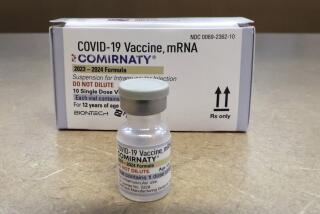Higher Calcium Intake for All Ages Urged : Health: A panel of experts calls for a national strategy to encourage more mineral consumption. It’s not just for older women anymore, report says.
- Share via
WASHINGTON — A federal advisory panel Wednesday called for a national public health strategy to encourage Americans--starting from childhood--to consume higher levels of calcium to ensure the growth of strong bones and reduce the risk of osteoporosis, a crippling bone disease.
The committee of outside experts, convened by the National Institutes of Health, said that optimal calcium intake is just as critical for children and young adults--including men--as it is for older women, who are especially vulnerable to the brittle bone disorder.
Calcium is an essential nutrient for building and maintaining strong bones throughout life, and can be found in many foods, particularly dairy products. An eight-ounce glass of milk, for example, provides about 300 milligrams of calcium. Calcium can also be obtained through the use of dietary supplements.
Information reviewed by the panel “indicates that millions of people in the United States are not getting enough calcium in their diets,” its report says.
Osteoporosis affects more than 25 million Americans and is the major underlying cause of bone fractures in post-menopausal women and the elderly. The panel said it has been estimated that, without some kind of intervention, the population of Americans older than 45 will suffer 5.2 million fractures and cost the health care system $45.2 billion over the next decade.
The two most important factors influencing the development of osteoporosis are achieving peak bone mass, which typically occurs by age 30, and the rate of bone loss in later years. Correct calcium levels are needed to reach peak bone mass and reduce the rate of bone loss associated with aging, the panel said.
The panel urged the federal government to “widely disseminate data” on nutrients, and said it should ensure that all of its food programs contribute to achieving optimal calcium levels.
The panel also recommended that, under health care reform, calcium supplements be covered “for those who cannot reach optimal calcium intake through food alone.”
The committee recommended specific amounts for each age group, either equal to or exceeding the current recommended daily allowances, and emphasized that calcium intake up to 2,000 mg. a day appears to be safe for most individuals.
The panel also urged that Americans consume adequate amounts of vitamin D, since it is essential for the proper absorption of calcium in the body.
The panel concluded that the optimal calcium intake for children and young adults should be between 1,200 and 1,500 mg. daily. The current recommended daily allowance is 1,200 mg. The panel said that recent evidence suggests that calcium intake between 1,200 and 1,500 mg. might result in higher peak adult bone mass.
“We want to focus on our children,” said Dr. John P. Bilezikian, professor of medicine and chief of the endocrinology division of Columbia University College of Physicians and Surgeons.
Women between the ages of 25 and 50 who are otherwise healthy should maintain a calcium intake of 1,000 mg. daily, the panel said.
Decreasing estrogen levels during menopause typically result in accelerated bone loss that lasts six to eight years, after which the loss becomes more gradual, similar to that seen in aging men.
Thus, post-menopausal women who are not taking estrogen replacement therapy should consume 1,500 mg. daily, and post-menopausal women who are on estrogen therapy should take 1,000 mg. a day, the panel recommended.
The daily intake for women older than 65 should be 1,500 mg., they said. Men older than 65 have risk factors for osteoporosis similar to those of women, and also may need to increase their calcium intake, the panel said. The group called for additional research to determine the appropriate calcium levels for older men.
The panel said that men 25 and older should consume 1,000 mg. of calcium daily.






